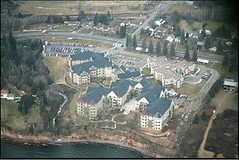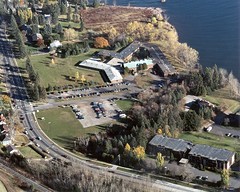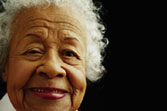Repositioning Senior Housing in Duluth
Posted By Dana Wollschlager, Director of Real Estate Development
 The photos above show the 'today' and 'yesterday' of our senior housing community in Duluth, Minnesota, called Lakeshore. Lakeshore is located just down the street from the historic Glensheen mansion.This senior housing development was a complete repositioning of an outdated nursing home. The new Lakeshore was designed with a lot of input from community members. They wanted this to be a place that you could live independently, but where you’d have easy access to health care. They wanted it to offer some of the best views on Lake Superior, and wanted it to be a destination place or a community that was an integral part of the larger community rather than isolated. Lakeshore, which includes full independent living, assisted living, memory care and rehabilitation services, hits all of those desires.We’ll soon direct you to the new Lakeshore web site. We’re finishing up some changes and adding some new photos (talk about great views). The new Lakeshore is a great example of senior housing development that repositions an outdated nursing home and creates housing that people want to live in while making health services easily accessible. The new Lakeshore expresses that 'aging is about living.'Next time you’re headed to the North Shore stop at Lakeshore and grab a sandwich or a pie at their Cascade Cafe. People from around around the area drive here for lunch, light dinner or a snack for the road.
The photos above show the 'today' and 'yesterday' of our senior housing community in Duluth, Minnesota, called Lakeshore. Lakeshore is located just down the street from the historic Glensheen mansion.This senior housing development was a complete repositioning of an outdated nursing home. The new Lakeshore was designed with a lot of input from community members. They wanted this to be a place that you could live independently, but where you’d have easy access to health care. They wanted it to offer some of the best views on Lake Superior, and wanted it to be a destination place or a community that was an integral part of the larger community rather than isolated. Lakeshore, which includes full independent living, assisted living, memory care and rehabilitation services, hits all of those desires.We’ll soon direct you to the new Lakeshore web site. We’re finishing up some changes and adding some new photos (talk about great views). The new Lakeshore is a great example of senior housing development that repositions an outdated nursing home and creates housing that people want to live in while making health services easily accessible. The new Lakeshore expresses that 'aging is about living.'Next time you’re headed to the North Shore stop at Lakeshore and grab a sandwich or a pie at their Cascade Cafe. People from around around the area drive here for lunch, light dinner or a snack for the road.
AOL Founder Tackles Health
Taking control of our own health earlier in our lives is essential to the health and financial future of our country, Minnesota and long term care, especially as we approach the age wave. If we can keep people healthier longer, we can help them live longer in their own homes and hold down public costs for expensive long term care. The average cost in the U.S. for assisted living is $35,000 per year; a nursing home is about $75,000 annually. Most nursing home costs are paid by the government through Medicaid.Steven Case, founder of AOL, is combining technology with people’s desire for more personal control over their future. Last Thursday he launched RevolutionHealth.com. According to CBS Marketwatch, his goal is to make health care resources, services and products easy to find and use so people will track their health just as they track their stocks online.Case says he’s targeting women in this venture, as they’re seen as most often the 'keepers of health' in the household. An area that would be very beneficial for Case to add to this site would be resources on long term care. Many of these baby boomer women he’s focusing upon are caring for their parents as well as their children.It could include information on what to ask a home care company, assisted living community, nursing home or other senior housing community when shopping for such services; how to pay for long term care if needed; a checklist to consider when trying to keep a parent as independent as possible … and other questions that are increasingly on baby boomers' and others' minds. Long term care providers also could provide such a site and really become the local knowledge broker for people.People turn to the net in droves. Of Internet users, 80%, or about 113 million adults, have researched a health topic online, according to the Pew Internet & American Life Project, a Washington nonprofit that looks at the social impacts of the Internet. Technology is only going to play a bigger impact in giving us more control in taking care of ourselves and aging successfully.
Minnesota and Senior Housing Development
Minnesota has about 1.5 million baby boomers. According to Ecumen’s Age Wave Study, here are the most important characteristics to them as they think about senior housing:
Independence
Nearby friends and family
Privacy
Easy-access health care
Safety
Ownership instead of renting
Easy-access shopping
Availability of spiritual opportunities
Easy-access transportation
Meaningful volunteer opportunities
Welcomed community involvement
Easy-access fitness opportunities
Travel opportunities
Educational opportunities
Multi-generational community
Waconia, Minnesota, recently built senior housing on the main street close to many community amenities rather than out in a corn field. It meets many of the criteria that baby boomers think are important to them. As we think about the future of Minnesota and senior housing, this is a great check list to start with and use in planning senior housing development.
Aging is an Active Verb!
 Aging is an active verb!Kudos to Aging Services of California, the state’s non-profit senior housing association, for adopting the tagline above. Anne Burns Johnson, president and CEO of Aging Services of California, said. 'Our goal is to present aging as an inclusive process, not a label placed on the elderly.'This type of positioning, focusing on aging as inclusive (everyone does it) and all about living (even at the end of life) is where the senior housing profession needs to be. We so often in senior housing and in society focus simply on aging as declinism. (I just saw an ad for assisted living. A woman was patting the senior customer on the head. It was so patronizing.) There is so much more to aging than physical decline, but we miss it.Guess what? Seniors still make out, still drive, still swim, still travel, still like to go to great restaurants … . and even when their bodies don’t let them do these things, they are still living. As we look at positioning in the senior housing profession via advertising, interactive communications, direct mail and public relations we and our customers would be well served on emphasizing that 'aging is an active verb.'
Aging is an active verb!Kudos to Aging Services of California, the state’s non-profit senior housing association, for adopting the tagline above. Anne Burns Johnson, president and CEO of Aging Services of California, said. 'Our goal is to present aging as an inclusive process, not a label placed on the elderly.'This type of positioning, focusing on aging as inclusive (everyone does it) and all about living (even at the end of life) is where the senior housing profession needs to be. We so often in senior housing and in society focus simply on aging as declinism. (I just saw an ad for assisted living. A woman was patting the senior customer on the head. It was so patronizing.) There is so much more to aging than physical decline, but we miss it.Guess what? Seniors still make out, still drive, still swim, still travel, still like to go to great restaurants … . and even when their bodies don’t let them do these things, they are still living. As we look at positioning in the senior housing profession via advertising, interactive communications, direct mail and public relations we and our customers would be well served on emphasizing that 'aging is an active verb.'
Upcoming Successful Aging Conferences
Two conferences coming up back to back the first week of May that look like they’ll have quite a bit of information related to successful aging.The Minnesota Senior Federation is holding 'To Life': Fullfilling Your Vision for Health, Wealth and Happiness. It’s Saturday, May 5th from 8 a.m. to 4:30 p.m. There are several tracks you can take, such as Lifestyles, where you’ll learn about things such as brain fitness. There are other tracks that include financial planning for the life you’ll want and issue areas, such as senior housing. The keynote speaker will be Bowen White, M.D., a humorous, insightful speaker who has been featured on CBS This Morning and the Wall Street Journal. He’ll discuss 'living fully.'HealthPartners is holding a conference called Forever Young: Baby Boomers Reinvent Retirement on May 4th at the Holiday Inn Metrodome in Minneapolis. Objectives of the conference are- Define the impact Baby Boomers will have on the future of healthcare.- Discuss the most current treatment strategies in treating the Baby Boomer with endocrine, heart, and depression issues.- Evaluate the benefits of healthy lifestyle and quality of life.- Discuss coping mechanisms to utilize in midlife and beyond.- Identify the physical, emotional, and psychosocial issues the Baby Boomer faces as they mature.
Larry King Celebrates 50 Years of Chatter.
Larry King, the CNN talk show host, is celebrating his 50th anniversary of interviewing some of the biggest names. Work is an integral part of Larry’s life. Like the baby boomers in our Age Wave study, Larry King is going to continue doing what he loves: his work. At 73, Larry has no plans to retire.
He’s changing aging and there will be many more like him who continue doing the things they enjoy as they get into their 70s, 80s and beyond. That is going to cause advertisers to get with it. Several years ago USA Today dropped Larry’s column because of 'demographics.' What they meant was that Larry was too often writing about people such as Frank Sinatra who was no longer alive.
Larry asked this question in an interview with Minneapolis Star Tribune writer Neal Justin. The Larry King profile is in today’s paper. '[On Larry King Live], there’s a lot more emphasis on whether we’ll appeal to people 25 to 42. I still don’t understand that if a guy is 65, gainfully employed and last year bought a Cadillac and this year might be thinking about a Lexus or a Lincoln, why we don’t want him?'
Smart, effective advertisers will put agesim in a box and bury it forever.
What Good is a Law if Nobody Knows About It?
Posted by Kathryn Roberts, CEO and President of EcumenWhat good is a law if people don’t know about it? It’s a question I had today when I heard news of a baby born in a Twin Cities suburb, who police say was stabbed 135 times and then placed in a garbage can. A state program is set up to prevent this type of tragic incident. Called the Safe Place program, it allows a mother to leave an unharmed newborn up to three days old at any hospital in the state anonymously and without fear of prosecution. Unfortunately few people know about the law.Vermont has received a great deal of press nationally for its 'Choices for Care' program, which allows people who qualify for Medicaid to use dollars to pay a loved one to provide care at home rather than in a nursing home. In our Age Wave survey of baby boomers, nearly 90% of Minnesotans said this is a good idea.Guess what? We already have a version of it in Minnesota. It’s called Consumer Directed Community Supports. According to the Department of Human Services, 120 people are enrolled in it. It could be a great tool for vital, successful aging. But how do people use it if they don’t know about it?As we face an unprecedented age wave, we have to look beyond senior housing and look at ways to keep people where they want to live. This could be one such tool.
Connecting Senior Housing Development to the Larger Community
Posted by Dana Wollschlager, director of real estate development A number of us had a tremendous opportunity to meet some new Ecumen customers yesterday: Pastor Dave Olson of First Lutheran Church in Sandpoint, Idaho and Norm Sommerfeld, who is chair of the First Lutheran Church board of directors. We are working with them to create a new senior housing development connected to First Lutheran Church in Sandpoint and they were touring Ecumen communities in Maplewood and one being built in North Branch.It was very refreshing to hear Pastor Dave talking about this development as a way to 'build community.' Not just a community for seniors, but one that is multi-generational and helps build bonds between the youngest of the congregation and the oldest. Baby boomers told us in our Age Wave Study that they want amenities such as places of worship nearby. We applaud Paster Dave, Norm and the entire First Lutheran congregation for their vision and commitment to vital, successful aging and looking at the synergies that can occur between senior housing and the larger community.
A number of us had a tremendous opportunity to meet some new Ecumen customers yesterday: Pastor Dave Olson of First Lutheran Church in Sandpoint, Idaho and Norm Sommerfeld, who is chair of the First Lutheran Church board of directors. We are working with them to create a new senior housing development connected to First Lutheran Church in Sandpoint and they were touring Ecumen communities in Maplewood and one being built in North Branch.It was very refreshing to hear Pastor Dave talking about this development as a way to 'build community.' Not just a community for seniors, but one that is multi-generational and helps build bonds between the youngest of the congregation and the oldest. Baby boomers told us in our Age Wave Study that they want amenities such as places of worship nearby. We applaud Paster Dave, Norm and the entire First Lutheran congregation for their vision and commitment to vital, successful aging and looking at the synergies that can occur between senior housing and the larger community.
First Lutheran Church of Sandpoint, Idaho Enters into Senior Housing Development Agreement With Ecumen
SANDPOINT, IDAHO €“ First Lutheran Church of Sandpoint has joined in a development agreement with Minnesota-based Ecumen, one of the country’s largest Lutheran senior housing organizations, to create a new senior community connected to First Lutheran Church. The development, called Luther Park at Sandpoint, is anticipated to break ground this fall. “This exciting new initiative will contribute greatly to a vibrant faith community that people can call home their entire lifetime, while serving greater Sandpoint by expanding housing options for our area’s seniors,” said Pastor Dave Olson of First Lutheran Church of Sandpoint. “We’re greatly looking forward to expanding our ministry and helping meet the growing housing and service needs of Sandpoint. “The vision for this community began nearly a half century ago when First Lutheran moved from 5th Avenue in downtown Sandpoint to its current 6 1/2 acre site at Olive & Ontario,” said Olson. “While Luther Park at Sandpoint will be €˜not for profit’ and affiliated with the Lutheran Church, we welcome and look forward to serving people of all religious backgrounds.”“This new community will encompass so much of what our customers are saying they desire, including services and technology that enhance people’s independence, close proximity to their place of worship, nearby shopping and on-site healthcare,” said Dana Wollschlager, Ecumen’s director of real estate development.“Our focus is on creating a community that the First Lutheran congregation, its neighbors and all of Sandpoint will be proud of.”The three-story senior housing development will have 60 residences including a mix of 1- and 2-bedroom floor plans that range in size from 571- to 967-square feet. A number of residences will provide views of the Selkirk and Cabinet Mountains.The development will include catered living, which provides a variety of health and personal assistance services as well as suites specially designed for memory care and enhanced assisted living care. Among the community’s amenities will be an indoor link to the church, grand fireplace gathering area, library and media center, community meeting rooms, a beauty and barber shop and walking paths.Independence-enhancing technology, such as QuietCare, also will be featured at the new Luther Park community. QuietCare is a 24-hour-a-day, 7-day a week wireless system that helps residents, caregivers and family members identify small health problems before they grow into larger ones. This technology has been featured in The New York Times, Wall Street Journal and on the CBS Evening News.First Lutheran Church of Sandpoint,which has 778 members, is located at 526 South Olive Street. It is affiliated with the Evangelical Lutheran Church in America (ELCA) and serves the community through a variety of ministries.
Ecumen also is an affiliate of the ELCA and is based in Shoreview, Minnesota. One of the country’s largest non-profit senior housing companies, Ecumen works to create “home” for older adults wherever they choose to live.
###
Subscribe
Subscribe to Ecumen Changing Aging blog by selecting your favorite feed reader icon below. When our blog is updated, you’ll find out.
  |
    |
    |
RSS Feeds €“ What You Need To KnowAbout RSS FeedsAn RSS (Really Simple Syndication) feed is designed to deliver requested information directly to your desktop. In order to receive this information, you must first subscribe to your chosen feed.What Do I Need To Subscribe To RSS Feeds?In order to receive updates via an RSS Feed, you need to have an RSS Feed Reader or Aggregator (as it is also called). The RSS Reader is the application used to check your list of RSS Feed subscriptions to deliver updates to your desktop. In short, a feed reader is an online application, stand alone or web based, that reads feeds. A feed reader is to feeds what an email application (such as Outlook) is to email; without it you cannot receive your updates.Types of AggregatorsClient-side readers and aggregators are typically constructed as standalone programs or extensions to existing programs such as web browsers.Web-based feed readers and news aggregators require no software installation and make the user’s “feeds” available on any computer with Web access. Both Google and Yahoo offer news aggregators. The list of subscription buttons above shows a variety of available feed readers. For example, if you use Google for your feed reader, you would click on  to subscribe to the RSS feed above.It’s free and no personal information is exchanged.Ready to Subscribe?Once you have signed up for an RSS feed reader, you are ready to start building your list of subscriptions. Subscribe to the feed above by clicking on your feed reader’s icon above.
to subscribe to the RSS feed above.It’s free and no personal information is exchanged.Ready to Subscribe?Once you have signed up for an RSS feed reader, you are ready to start building your list of subscriptions. Subscribe to the feed above by clicking on your feed reader’s icon above.
An Opportunity to Change the Way We Think About Aging
Ecumen CEO Kathryn Roberts had an op-ed published in today’s Saint Paul Pioneer Press on preparing for the age wave. The text follows:Herb Carneal was a wonderful person and announcer, and also a role model for vital, successful aging. His family and friends were always near. He embraced his work. And he lived and died where he wanted - at home.At Ecumen we’re vested in helping more people live as Herb did. To help get there, we recently commissioned the largest survey of Minnesota baby boomers - the biggest tide of the coming age wave - to see how they foresee living as seniors. Their opinions reveal astounding opportunities for leadership in reinventing aging and paying for the freedom we desire.Money-saving flexibility: Vermont’s nationally acclaimed 'Choices for Care' initiative lets Medicaid - assistance for the poor - pay for home care, which averages $20,000 annually in Vermont versus $40,000 for a nursing home. Nearly nine of 10 boomers (89 percent) embrace the initiative. (Interestingly, about three years ago Minnesota began a similar program. Few know it exists. The unwieldy 'Consumer Directed Community Supports' program is buried deeply in the Department of Human Services Web site, where it says about 120 people use it. Inquiring about it, a colleague received an 88-page booklet. Let’s seize the opportunity to simplify this and remove it from the closet. If it’s hidden because of costs, let’s say so and build something better.)Wired for freedom: Boomers love on-demand tech tools. In fact, 92 percent expect technology to enhance their independence as seniors. Take, for example, digital sensor technology. It unobtrusively learns a person’s daily routines and sends 24/7 motion updates to a caregiver’s or family member’s computer or cell phone. It helps spot small health issues before they expand in complexity and expense. It connects people across distances and gives caregivers and physicians data earlier. Two years ago, six early adopters piloted this for us in Maplewood. Now 600 of our customers use it.Ireland, seeing aging as an economic opportunity, recently joined Intel on a development center to create proactive digital technologies that help European seniors live how they want to live, where they want to. Minnesota could step ahead if we used our ingenuity to develop such technologies here.Better payment options: Don’t like the phrase 'long-term care'? Most boomers don’t, either. So why do companies try selling difficult-to-understand long-term care insurance? Few buy it or trust it. Boomers want more flexible hybrid products, such as life insurance that could be tapped for care if needed. And nearly 100 percent of boomers we surveyed want a simple point-and-click Web site to comparison shop for state-endorsed savings and payment options. Boomers see these as keys to living life how they want to, rather than one-way tickets to a nursing home. Products emphasizing that aging is about living - even toward the end of life - will create a better market-government balance and allow more independence. But thinking differently will also improve the safety net for those in need.Downtown development: Most boomers point to rural or suburban communities as their ideal retirement location. Only 10 percent say the urban core is where they want to be. But, with foresight, the age wave could benefit St. Paul as much as the river current has. Boomers want nearby health care, transportation, worship places, shopping, education, fitness and multi-generational living. St. Paul has many of these dots, and light rail could connect more.In Chicago, the Franciscan Sisters and Loyola University built The Clare at Water Tower to bring people downtown. This isn’t sterile, cookie-cutter housing. Architecturally stunning, it houses college classrooms, a performance center, day spa, rooftop terrace and restaurants. Called a life-care community, it also has memory and hospice care. A person, in return for an entry fee, never has to leave, even if his or her assets are depleted. It’s a new, successful entrepreneurial product based on the idea that aging is an active verb.Minnesota’s 1.5 million baby boomers are sounding a declaration of independence. It’s a human desire. And we can meet it if we lead in changing aging.Kathryn Roberts is CEO of Shoreview-based Ecumen, which is Minnesota’s largest nonprofit senior housing and services company. Read the full Ecumen Age Wave Study.

